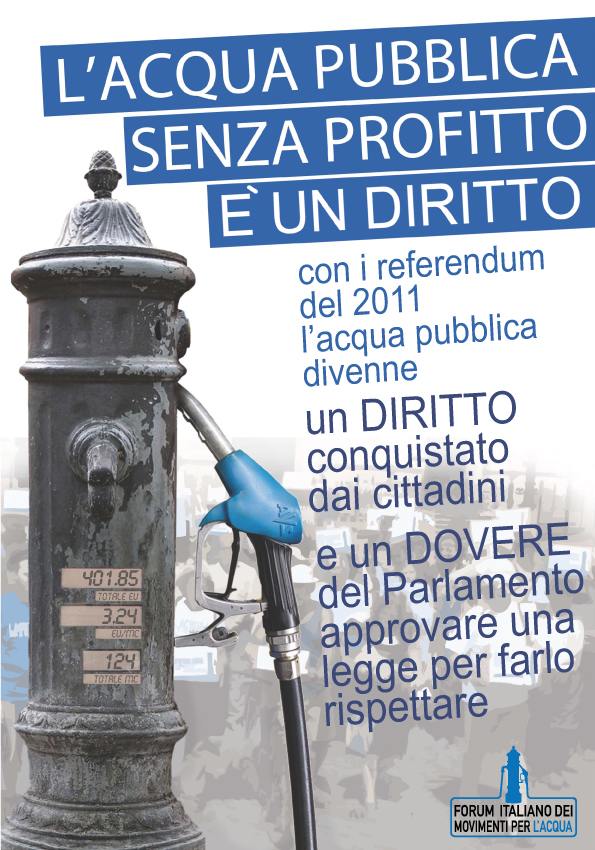Articoli
FAME 2012 - Final Statement Marseille
- Dettagli
- Pubblicato: Mercoledì, 28 Marzo 2012 14:48
INTRODUCTION
As members of the water justice movement gathered in Marseille, France we propose a positive agenda of global water justice. We share a common vision of water as a human right and a commons, not a commodity. We celebrate the United Nations’ recognition of the human right to water and sanitation (Resolution 64/292), as well as the adoption of this right in several constitutions and laws around the world.
In response to the growing privatization of water, we: uphold water as the basic element of all life on the planet and as a fundamental and inalienable human right; insist that solidarity between present and future generations should be guaranteed; reject all forms of water privatization and declare that the management and control of water must be public, cooperative, participatory, equitable, and not for profit; and call for the democratic and sustainable management of ecosystems, and for the preservation of the integrity of the water cycle and waterways’ rights to flow through the protection and proper management of human use of watersheds and environment. By contrast, we oppose the dominant economic and financial model that prescribes the privatization, commercialization, and corporatization of public water and sanitation services.
CONTEXT
Western, extractive, capitalist development has created dramatic and profound global economic, social, and environmental crises. The undemocratic, neo-liberal capitalist structure which led to this situation and the World Water Forum and World Water Council, which are completely committed to this model, are now collapsing along with the system.
Their approach, which considers water a commodity, against the will of the people, is both unjust and ineffective in bringing about access to water and sanitation for all.
Thanks to the Movement for Water Justice, the United Nations has recognized the human right to water and sanitation. There have been significant subsequent victories, including: the adoption by several states in Latin America of constitutional amendments recognizing this right; the success of the Italian referendum against the privatization of water management; the remunicipalization of water in Paris and in numerous other cities around the world; and the first decisions recognizing the right to water by national judiciaries.
CALLS AND COMMITMENTS
We endeavor to continue and increase this dynamic momentum toward this most fundamental right through concrete propositions which concern the political, democratic, environmental, and social dimensions of this issue:
We support public and community-based water management: we propose public-public and public-community partnerships.
We call for “real democracy”: impacted populations should take part in the important decisions regarding water, like, for example, the choice of water management or the implementation of a large project. Community participation is essential in this process.
We propose the implementation of independent international legal systems that can guarantee the right to water and sanitation. This right should be contestable throughout the world by any person, and those who commit crimes against this right should be held accountable. In particular, the demand has emerged for an International Criminal Court on the Environment to be created.
We recognize the importance of traditional knowledge and customs. We defend indigenous rights and practices.
We support small scale and familial agriculture that is respectful of the environment. We favor real food sovereignty which permits each person to eat, have access to water and land.
We reaffirm the rights of women as central to the global water struggle.
We reaffirm the right to water for all: access to water for all, without condition, in necessary quantity for life is a collective responsibility. If tariffs are deemed necessary, they should be progressive to avoid social exclusion.
We support the preservation and the integrity of the water cycle in the framework of the recognition of the rights of ecosystems and species to exist, thrive, and evolve.
We are against the industrial exploitation of natural commons in all its forms, especially mining and hydrocarbons including gas and shale oil, which also impact the integrity of water resources.
We demand the development of a transition to local, alternative, and sustainable energy systems that include a reduction of energy consumption. This transition implies notably, the immediate prohibition of gas and oil fracking as well as the adoption by international organizations of a moratorium on large dams.
IN THE SPIRIT OF OUR DEMANDS:
We call on States to recognize in domestic law the rights of all people to water and sanitation in accordance with U.N. Resolution 64/292.
We call on governments to challenge the authority and legitimacy of the World Water Forum as a space for developing good water governance/policymaking, affirming the importance of democratic water governance and the human right to water.
We call on the UN General Assembly to organize a democratic global summit on water in October 2014 that will result in committed Member State obligations to implement the human right to water and sanitation, in a manner accountable to the global community. The growing water crisis requires a legitimate, accountable, transparent, democratic summit on water. This summit must enable meaningful and open discussions with impacted communities, workers, indigenous peoples and civil society, and must result in binding commitments, not ministerial statements.
In implementing the human right to water, we call for respect for indigenous rights and sovereignty and recognition of indigenous knowledge, governance and jurisdiction.
We call on governments to join us in rejecting false solutions to the global environmental and financial crises proposed by the “green economy”. Strategies such as large-scale dams, nuclear power plants, agro-fuel plantations, and mono-crop industrial agriculture jeopardize the quantity and quality of water. We embrace economic systems that serve the goal of healthy human and environmental communities, not maximization of individual wealth.
We call on governments to follow the recommendations of the World Commission on Dams and not to endorse the voluntary approach of the Hydropower Sustainability Assessment Protocol.
We call on States to finance public water and sanitation systems through progressive taxation and/or domestic and international financial transaction taxes. The human right to water requires adequate public financing. The pattern of economic austerity in the global North and structural adjustment in the global South that has led governments to slash spending for vital water and sanitation services and allowed private corporations greater access to these sectors must end.
States should ensure that International Financial Institutions cease all activities that promote privatization, corporatization or otherwise undermine democratic control of water and water governance.
We call for public resources to be allocated to public-public and public-community partnerships, ensuring that public sector best practices are shared among those requiring capacity building and training.
We commit to continue building networks and new social alliances, broadening and deepening our connections with social movements fighting for food sovereignty, climate justice, democracy and social justice.
We commit to involve both local authorities and parliamentarians who are determined to defend water as a common good and to reaffirm the right to fresh water for all human beings and nature.
We are encouraging all public water utilities to collaborate, establishing national associations and regional networks.
We denounce the criminalization and violent repression of social struggles for water, which has most recently resulted in the murder on March 15th, 2012 (during FAME) of Bernardo Vasquez Sanchez who was fighting against mining companies in Mexico.
We celebrate our achievements and we look forward for our continued collaboration across countries and continents!





